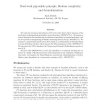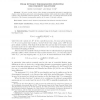150 search results - page 3 / 30 » Counting Results in Weak Formalisms |
COCO
1993
Springer
14 years 26 days ago
1993
Springer
We introduce a linear algebraic model of computation, the Span Program, and prove several upper and lower bounds on it. These results yield the following applications in complexit...
IJCAI
2007
13 years 10 months ago
2007
We introduce a new technique for counting models of Boolean satis´Čüability problems. Our approach incorporates information obtained from sampling the solution space. Unlike previ...
APAL
2004
13 years 8 months ago
2004
We study the extension (introduced as BT in [5]) of the theory S1 2 by instances of the dual (onto) weak pigeonhole principle for p-time functions, dWPHP(PV )x x2 . We propose a n...
SIAMCO
2011
12 years 11 months ago
2011
Abstract. We prove a weak version of the dynamic programming principle for standard stochastic control problems and mixed control-stopping problems, which avoids the technical di´Č...
ICDCS
2008
IEEE
14 years 3 months ago
2008
IEEE
Self-stabilization is a strong property which guarantees that a network always resume a correct behavior starting from an arbitrary initial state. Weaker guarantees have later bee...


